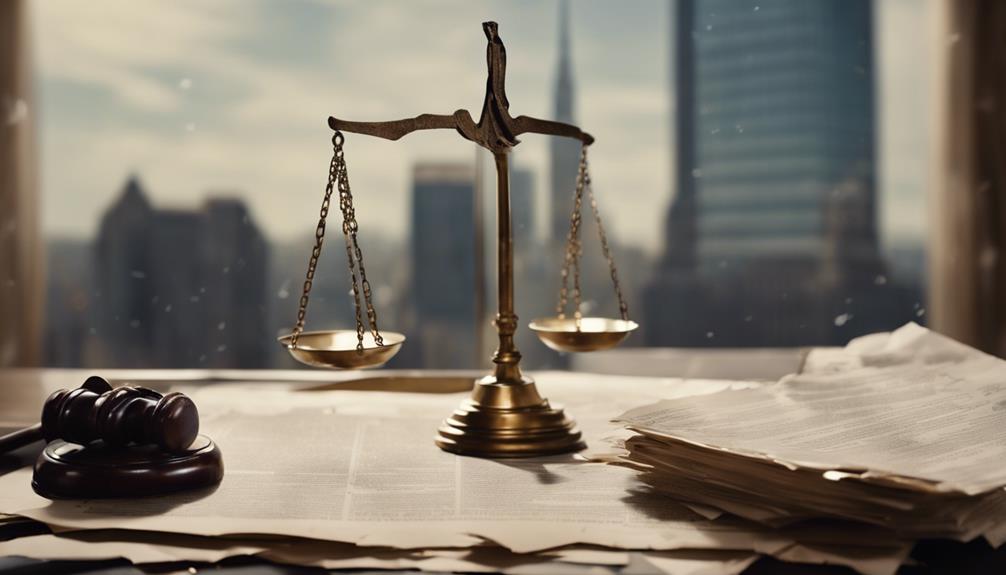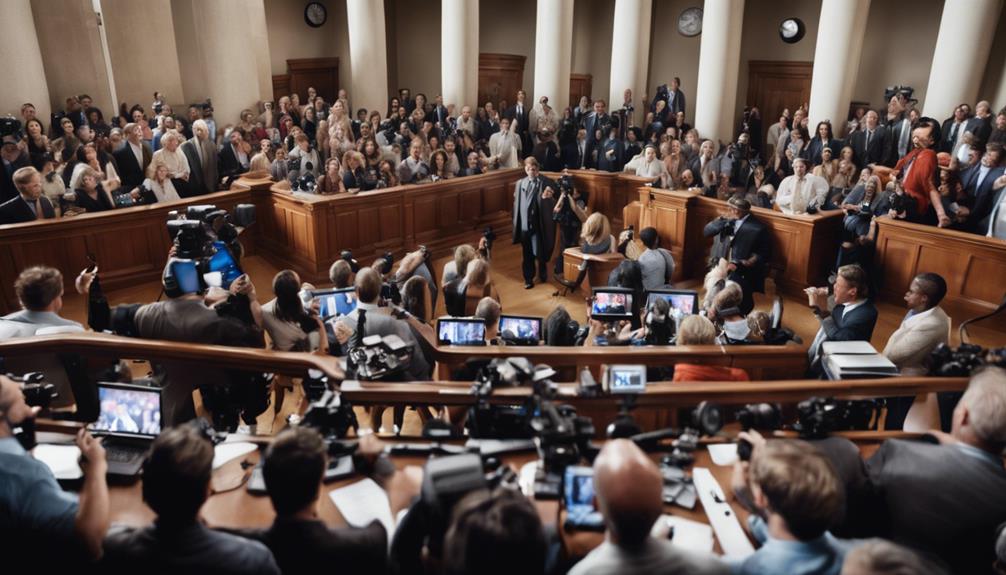Billionaires like Jeff Bezos, Elon Musk, and Warren Buffett exploit tax loopholes to minimize income taxes, paying markedly lower rates compared to middle-class households, with a staggering 90% of their wealth remaining untaxed. This inequality is perpetuated by policies favoring the wealthy, allowing them to exploit loopholes and avoid a fair tax share. The top 1% and 0.1% experience substantial income growth, while middle-class households bear an unequal tax burden. To address this, two-thirds of Americans support raising taxes on the wealthy and corporations. As the wealth disparity continues to grow, examining the intricate mechanisms behind tax laws and their impact on the rich and famous reveals a complex web of loopholes and elite favoritism.
Key Takeaways
• Billionaires like Bezos, Musk, and Buffett exploit tax loopholes to minimize income taxes, paying lower rates than middle-class households.
• Wealthy individuals offset earnings with losses and deductions, primarily from assets like stock and property, to lower effective tax rates.
• The wealthy exploit loopholes, burdening the middle class with tax responsibilities, with the top 1% and 0.1% experiencing significant income growth.
• Two-thirds of Americans support raising taxes on the wealthy and corporations to address income inequality and create a fairer tax system.
• Urgent action is needed to overhaul the tax code, closing loopholes and deductions that disproportionately benefit billionaires and large corporations.
Billionaires' Tax Loophole Exploitation
How do billionaires like Bezos, Musk, and Buffett manage to pay little to no income tax despite their massive fortunes? The answer lies in their clever exploitation of tax loopholes. ProPublica's investigation revealed that these ultrarich individuals legally minimize their income taxes by offsetting earnings with losses and deductions. Their wealth, primarily composed of assets like stock and property, remains untaxed until sold, contributing to their minimal tax payments. Data shows that billionaires pay considerably lower tax rates compared to middle-class households, highlighting the wealth gap in tax contributions.
Strategies like borrowing money against assets and owning non-taxable assets aid billionaires in lowering their effective tax rates. The lack of asset taxation allows the ultrarich to accumulate wealth without substantial tax liabilities. This stark contrast in tax payments perpetuates the wealth gap, as the middle class bears a disproportionate burden. The fact that billionaires like Bezos, Musk, and Buffett can exploit tax loopholes to pay little to no income tax underscores the need for tax reform to address this growing wealth disparity.
Historical Roots of Tax Inequality

As the United States emerged from the Great Depression, the government's response to economic hardship laid the groundwork for the historical roots of tax inequality that would eventually favor the rich and famous. The implementation of the Wealth Tax in 1935, which could take up to 75% of high incomes, exemplified attempts to address income inequality through progressive taxation. However, this effort was undermined by tax evasion and exploitation of loopholes by wealthy individuals, highlighting the need for revisions in tax laws.
The Revenue Act of 1937 addressed some of these issues, but the problem persisted. President Franklin D. Roosevelt's New Deal programs aimed to address economic challenges, but also led to an increase in taxes, contributing to tax disparities.
- Tax inequality has been perpetuated by policies that favor the wealthy
- The wealthy have exploited loopholes, avoiding their fair share of taxes
- The government's response to economic hardship has often favored the rich and famous
U.S. Tax Code Failing the Masses

The U.S. tax code is failing the masses, with wealth disparity growing exponentially as loopholes remain unchecked, and the middle class suffers as a result. Recent polls show that 2 in every 3 Americans support raising taxes on the wealthy and corporations to fix the tax code, highlighting the need for urgent reforms.
As the top 1% and 0.1% continue to see significant income growth, it's clear that the current system is fundamentally unfair and in need of drastic change.
Wealth Disparity Grows
Wealth disparity grows exponentially, fueled by a tax code that disproportionately favors the rich, perpetuating a system where billionaires and corporations reap benefits at the expense of the masses. As a result, the wealthiest Americans continue to accumulate more wealth, while the majority of the population struggles to make ends meet. This growing wealth inequality is evident in the fact that the top 1% and 0.1% of the population have experienced significant income growth, further widening the gap between the rich and the poor.
2 in 3 Americans support raising taxes on the wealthy and corporations to fix the tax code, highlighting the need for reform.
High-income individuals often pay lower effective tax rates, showcasing the unfair advantages afforded to the wealthy.
Tax loopholes and deductions disproportionately favor billionaires and large corporations, exacerbating wealth disparities.
The current tax system is failing the masses, and urgent reforms are needed to address the fundamental failings of the U.S. tax code and create a fairer system for all Americans.
Loopholes Remain Unchecked
Nearly 90% of billionaires' wealth remains untaxed, thanks to loopholes in the U.S. tax code that allow them to strategically offset earnings with losses and deductions. Wealthy individuals like Bezos, Musk, and Buffett have exploited these loopholes to pay minimal to no federal income taxes compared to their immense wealth.
ProPublica's investigation revealed how billionaires strategically offset earnings with losses and deductions to avoid income tax, showcasing the flaws in the tax system. As a result, middle-class households bear an unequal tax burden, paying a significant portion of their income in federal taxes.
The ultrawealthy's wealth growth from assets like stock and property remains untaxed until sold, allowing them to accumulate wealth without paying their fair share in taxes. Critics point to the unchecked loopholes in the U.S. tax code as a major factor contributing to wealth disparity and income inequality in society. These loopholes enable the wealthy to accumulate wealth at the expense of the masses, perpetuating the growing wealth gap.
Middle Class Suffers
As the wealthy continue to exploit loopholes, the middle class is left to bear the brunt of the tax burden, perpetuating a system where those who can least afford it are shoulder the load. The data is clear: while the 25 wealthiest Americans experienced a $401 billion wealth increase from 2014 to 2018, they paid a mere 3.4% true tax rate. Meanwhile, middle-class households saw their net worth grow by $65,000 after taxes during the same period.
The median American household pays around 14% in federal taxes, highlighting the tax disparity faced by the middle class.
Warren Buffett, a vocal advocate for higher taxes on the rich, paid a mere 0.1% true tax rate from 2014 to 2018, showing that even those who advocate for change don't practice what they preach.
The reality is that loopholes in the tax system allow billionaires to pay minimal income taxes relative to their wealth growth, impacting the middle class.
The tax returns of the wealthiest Americans are a stark contrast to those of the middle class, who are shouldering the bulk of the federal taxes.
Wealth Disparity and Tax Avoidance

The wealthy elite, including billionaires like Bezos, Musk, and Buffett, have been exposed for paying minimal income taxes despite their immense wealth. By exploiting tax loopholes and utilizing strategies like offsetting earnings with losses and deductions, they can legally sidestep the tax system.
As a result, the ultrawealthy are able to accumulate wealth without significant tax obligations, further exacerbating the wealth disparity between the rich and the rest.
Hidden Wealth Havens
Wealthy individuals exploit loopholes in tax laws to stash their riches in hidden wealth havens, shielding their fortunes from taxation. This phenomenon contributes to the widening wealth disparity in the country. The ultrawealthy, including billionaires like Bezos, Musk, and Buffett, have mastered the art of minimizing their tax liabilities. They accumulate wealth through assets like stocks and property, which remain untaxed until sold, allowing them to pay much lower income taxes relative to their expanding fortunes.
Median American households pay around 14% in federal taxes, while the ultrarich often find ways to avoid this level of taxation effectively. The top 25 wealthiest Americans paid only a 3.4% average tax rate from 2014 to 2018, highlighting disparities in the tax system. Analysis of true tax rates reveals that the ultrawealthy exploit tax laws to pay minimal to no income taxes compared to their immense wealth.
The current tax laws enable the ultrawealthy to accumulate wealth without being subject to substantial taxation, perpetuating the wealth disparity in the country.
Tax Loophole Exploitation
Billionaires like Bezos, Musk, and Buffett have refined the art of exploiting tax loopholes, legally sidestepping the tax system to pay minimal to no federal income taxes despite their immense wealth. IRS data obtained by ProPublica reveals how these ultrawealthy individuals legally avoid paying substantial income taxes, taking advantage of tax loopholes to accumulate wealth without significant tax obligations.
Assets like stock and property, major sources of billionaires' wealth, remain untaxed until sold, allowing them to grow their wealth without substantial tax burdens. The true tax rate analysis shows that the 25 wealthiest Americans paid only a 3.4% average tax rate from 2014 to 2018, highlighting the disparities in the tax system. Remarkably, figures like Warren Buffett, who advocate for higher taxes for the rich, paid a remarkably low true tax rate of 0.1% during the same period, showcasing the impact of tax avoidance strategies on society.
This wealth disparity and tax avoidance underscore the necessity for tax reform to guarantee a more equitable distribution of tax obligations.
Tax Policies Favoring the Elite

Sophisticated tax planning and clever use of loopholes allow ultra-high-net-worth individuals to pay minimal income taxes, perpetuating the widening wealth gap. Wealthy individuals like Jeff Bezos, Elon Musk, and Warren Buffett have been able to legally pay minimal income taxes compared to their vast fortunes. This is largely due to tax policies that favor the elite, allowing them to accumulate wealth without contributing proportionally to tax revenue.
- The ultra-rich exploit tax loopholes, avoiding their fair share of taxes while the middle class bears the burden.
- The wealthy use borrowing strategies and sophisticated tax planning to preserve their large fortunes and avoid significant tax burdens.
- Critics argue that current tax policies favor the wealthy and powerful, exacerbating wealth disparities.
Current tax policies enable the wealthy to avoid paying their fair share of taxes, contributing to the growing wealth gap. It's crucial to reform these policies to make sure that everyone contributes their fair share, regardless of their wealth or social status.
The Billionaire Tax Gap Exposed

A recent investigation by ProPublica has brought to light the stark reality of the billionaire tax gap, exposing how the ultrawealthy, including Bezos, Musk, and Buffett, have paid little to no income tax compared to their vast fortunes. The data reveals that wealthy individuals, such as Bezos, paid no federal income taxes in specific years, showcasing the disparity in tax obligations.
The IRS data obtained by ProPublica highlights how the ultrawealthy can legally minimize their income tax payments in comparison to their increasing fortunes. Middle-class households pay a considerably higher percentage of their income in federal taxes compared to the ultrarich individuals like Bloomberg and Icahn.
The investigation exposes loopholes that allow billionaires to effectively sidestep paying their fair share of income taxes based on their wealth growth. These tax loopholes have enabled billionaires to avoid paying billions of dollars in income taxes, further widening the wealth gap.
The stark contrast between the tax obligations of the ultrawealthy and the middle class has sparked outrage and calls for tax reform.
Unfair Tax Burdens on the Middle Class

Middle-class households, shouldering an unfair burden, have been paying considerably higher taxes compared to the ultrawealthy, further widening the wealth gap. The disparity is staggering, with middle-class households paying nearly $62,000 in taxes from 2014 to 2018, while seeing their net worth grow by only $65,000. In contrast, the 25 wealthiest Americans had a true tax rate of 3.4% during the same period, despite their wealth increasing by $401 billion.
This unfair tax burden can evoke strong emotions in many Americans:
- Median American households typically pay around 14% in federal taxes, highlighting the disproportionate tax burden on the middle class.
- Wealthy individuals exploiting tax loopholes contribute to the unfair tax burdens faced by the middle class.
- Warren Buffett, advocating for higher taxes for the rich, paid a mere 0.1% true tax rate from 2014 to 2018, sparking outrage among many Americans.
The current tax system disproportionately affects the middle class, with wealthy individuals taking advantage of loopholes to minimize their tax liability. This unfair burden is a significant concern for many Americans, who feel that the wealthy should be contributing their fair share to the federal tax system.
Reforming the Tax System for All

As Americans increasingly voice their discontent with the current tax system, policymakers are faced with the urgent task of overhauling the tax code to guarantee fairness and equity for all.
Recent polls show that two-thirds of Americans support raising taxes on the wealthy and corporations to fix the tax code, highlighting the need for reform. The federal government must address the rising income inequality, which has seen the top 1% and 0.1% reap significant income growth, exacerbating wealth disparities. Tax loopholes and deductions disproportionately benefit billionaires and large corporations, contributing to the problem.
High-income individuals often pay lower effective tax rates, emphasizing the need for tax reforms. Urgent action is necessary to create a fairer tax system for all by implementing progressive changes and addressing fundamental inequalities. By doing so, the federal government can guarantee that the tax code serves the many, not just the privileged few.
Frequently Asked Questions
How Does the Tax System Benefit the Wealthy?
Wealthy individuals like Jeff Bezos and Elon Musk benefit from the tax system as it allows them to legally pay minimal income taxes compared to their immense wealth. Since their wealth comes from assets like stock and property, they're not taxable until sold, enabling them to sidestep the tax system effectively.
What Does the IRS Consider Rich?
The IRS deems individuals with an annual income of $523,601 or more as part of the top 1% of earners in the U.S. This threshold defines who's considered 'rich' in the eyes of the tax authority.
Understanding this categorization is crucial, as it greatly impacts tax obligations and wealth preservation strategies employed by high-net-worth individuals.
What Did the Wealth Tax Act Do?
The Wealth Tax Act of 1935, introduced by President Roosevelt as part of his New Deal programs, aimed to address wealth inequality by imposing high taxes on the wealthy.
It targeted individuals with substantial assets and income, taking up to 75% of high incomes to fund government programs and initiatives.
The act was a significant step towards redistributing wealth and promoting economic equity during the Great Depression.
Who Pays the Most Taxes According to the Irs?
According to the IRS, the top 1% of earners pay the most taxes. In 2020, the top 1% of taxpayers, those with incomes above $546,434, paid 38.8% of total federal income taxes.
The top 10% of earners, with incomes above $173,551, paid 71.4% of total federal income taxes. These high-income individuals bear a significant portion of the federal tax burden, while the ultrarich often find ways to minimize their tax liability.
Conclusion
As the billionaire tax gap widens, the American Dream slips further out of reach for the middle class. Like a game of musical chairs, the wealthy exploit loopholes, leaving the masses to foot the bill.
It's time to rewrite the tax code's uneven score, ensuring fairness and transparency. As Warren Buffett aptly put it, 'If you stick me down in the middle of Bangladesh or Peru, I won't be hungry for long. But the people will be hungry, and they'll be hungry for a long time.'
Reform is long overdue.











